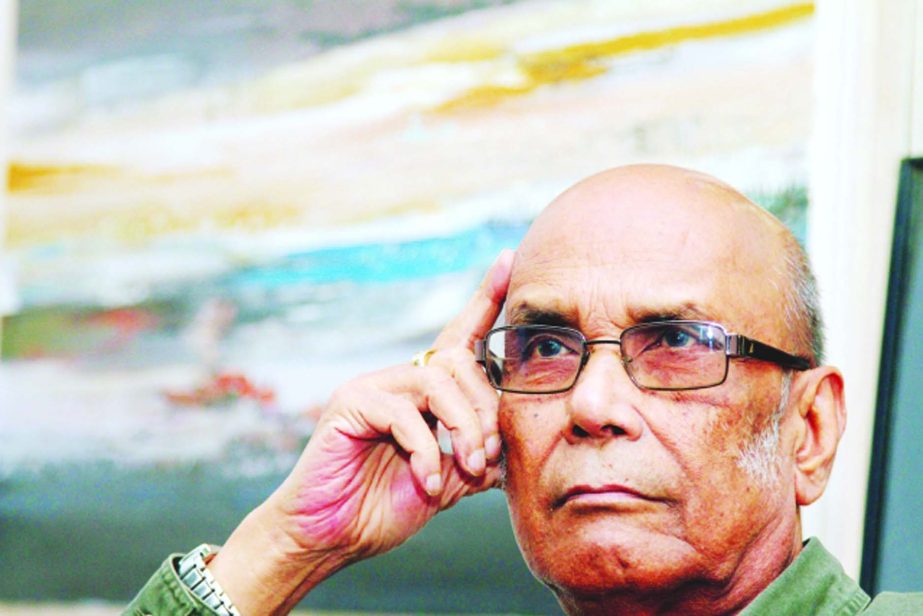
A prominent poet and writer Syed Shamsul Haq was born in the small town Kurigram on 27 December in 1935. His father was Syed Siddique Husain, a homeopathic physician. His mother was Halima Khatun. His father came to Kurigram to pursue in the practice of medicine. Traditionally they belonged to a Peer (Saint) family. Haq’s father broke the family tradition and studied in the main stream course of English education and then took up Medicine. Haq passed his childhood in Kurigram. During his childhood he observed the events of World War II.
Syed Shamsul Haq married Dr Anwara Syed Haq. They have one daughter, Bidita Sadiq and one son, Ditio Syed Haq. Bidita teaches English literature at higher school level. Ditio, an IT specialist, writes stories, lyrics and music.
Syed Shamsul Haq wrote poetry, fiction, plays-mostly in verse and essays. His literary works were included in the curriculum of school level, secondary, higher secondary and graduation level Bengali literature in Bangladesh.
Syed Shamsul Haq’s works : Poetry: Ekoda Ek Rajje (Once upon a time in a kingdom, 1961), Boishekhe Rochito Ponktimala (Verses of Boishakh, 1969), Birotihin Utsob (The ceaseless festival, 1969), Protidhonigon (The echos, 1976), Opor Purush (The other man, 1978), Kobita Samagra (Collected Poems) in 3 Volumes
Novels : Ek Mahilar Chhobi (Portrait of a Woman, 1959), Anupam Din (Best Days, 1962), Simana Chhariye (Beyond the Bounds, 1964), Neel Dangshon (The Blue Sting, 1981), Smritimedh (Massacre of Memory, 1986), Mrigayay Kalakshep (Spending Time in Deer Hunting, 1986), Stabdhatar Anubad (Translation of Silence, 1987), Ek Juboker Chhayapath (The Milky Way of a Youth, 1987), Swapna Sankranta (Regarding Dreams, 1989), Brishti O Bidrohigon (Rain and the Rebels, 1996), Baro Diner Shishu (A Child of Twelve Days, 1989), Banabala Kichu Taka Dhar Niyechhilo (Banabala Borrowed Some Money, 1989), Trahi (Save Our Soul, 1989), Tumi Sei Tarbari (You are That Sword, 1986), Kayekti Manusher Sonali Jouban (Golden Youth of a Few Human Beings, 1989), Shreshtho Uponyas (Best Novels, 1990), Nirbasita (The Exiled Woman, 1990), Nishiddha Loban (Forbidden Incense, 1990), Khelaram Khele Ja (Keep It Up, Kilroy, 1991), Megh O Machine (Cloud and Machine, 1991), Iha Manush (This is a Human Being, 1991), Mahashunye Poran Master (Poran Master in the Space), Dwitiya Diner Kahini (Story of the Second Day), Balikar Candrojan (The Girl’s Lunar Vessel), Ayna Bibir Pala (The Ballad of Ayna Bibi), Kaldharma (Religion of the Time), Duratwa (Distance), Na Jeyo Na (No, Don’t Go), Onya Ek Alingan (A Different Embrace), Ek Mutho Janmabhumi (A Fistful of Motherland), Bukjhim Bhalobasa (Love that Makes the Chest Ache), Acena (Unknown), Alor Jonyo (For Light), Rajar Sundari (The Beautiful Girl of the King), Gupta Jibon Prakashya Mritu, Chokebazi
Stories: Tash (Cards, 1954), Seet Bikel (A cold afternoon, 1959), Rokto Golap (Blood rose, 1964), Anonder Mrittu (A blissful death, 1967), Collected Short Stories (2006),
Plays : Payer Awaj Paoa Jay (We hear the footsteps), Nuruldiner Sara Jibon (The entire life of Nurul Din), Ekhane Ekhon (Here, now), Ganonayaka (The public hero), Eersha (Envy), Narigon (The women), Uttarbangsha, Khatta Tamasha (Bitter jokes), Judhha ebong Judhha (War and war), Collected Verse plays, Collected plays
Poems: Amar Porichoy, Ekey Bujhi Manush Bole, Poraner Gohin Vitor – 1, Mrityur Shorir Venge, Nisongo Kobi, Nirjon Restora, Bongobondhur Somadhite, Valobashar Dine, Poraner Gohin Vitor – 4, Aro Ekjon, Ami Ektukhani Darabo, Poraner Gohin Vitor – 11, Shadhinota Dibosh: 2007, Tumi E Shudhui Tumi, Ekhon Modhyorat
Translations: Shakespear’s Macbeth, Tempest, Troilus and Cresida, Ibsen’s Pyr Gynt
Awards : Bangla Academy Award (1966), Adamjee Literary Award (1969), Alakta Gold Medal (1982), Alaol Literary Award (1983), Kabitalap Award (1983), Literary Award of the Association of Women Writers, Ekushey Padak (1984), Jebunnessa-Mahbubullah Gold Medal (1985), Padabali Kabita Award (1987), Nasiruddin Gold Medal (1990), National Poetry Award (1997), national Poetry Honour (2001),TENAS Medal (1990)., Swadhinata Padak (2000).
Eminent poet and writer Syed Shamsul Haq breathed his last on September 27, 2016 at the age of 81. He died of cancer at the United Hospital, Dhaka, where he was undergoing treatment for lung cancer after returning from London.
President Abdul Hamid and Prime Minister Sheikh Hasina have expressed profound shock at the death of the poet.
In a condolence message on Tuesday, the President said, “Syed Shamsul Haq is a bright star of Bengali literature. His undertaking in all sections of literature will make him immortal.”
“His death is an irreparable loss to the Bengali literature. The strong writing of Syed Haq, a soldier of pro-liberation forces, will show path to the nation forever,” said the President.
He prayed for eternal peace of the departed soul of the litterateur and conveyed sympathy to members of the bereaved family.
Terming Haque as a conscience of the nation the Prime Minister said the country lost “a writer who was devoted to the truth while she personally lost one of her well-wishers at his death,” the Press Secretary quoted her as saying.
“Syed Shamsul Haq has viewed Bangalee, Bangladesh and Bangabandhu as inseparable entities and through his powerful writings he showed the nation the dream of a secular country,” the premier said.
Sheikh Hasina added: “Syed Haq’s death is an irreparable loss of the national arena of literature and culture.”
She said Haq’s literary works would always show the nation a right direction.
The Prime Minister prayed for eternal peace of the departed soul and conveyed profound sympathy to the bereaved family members.

